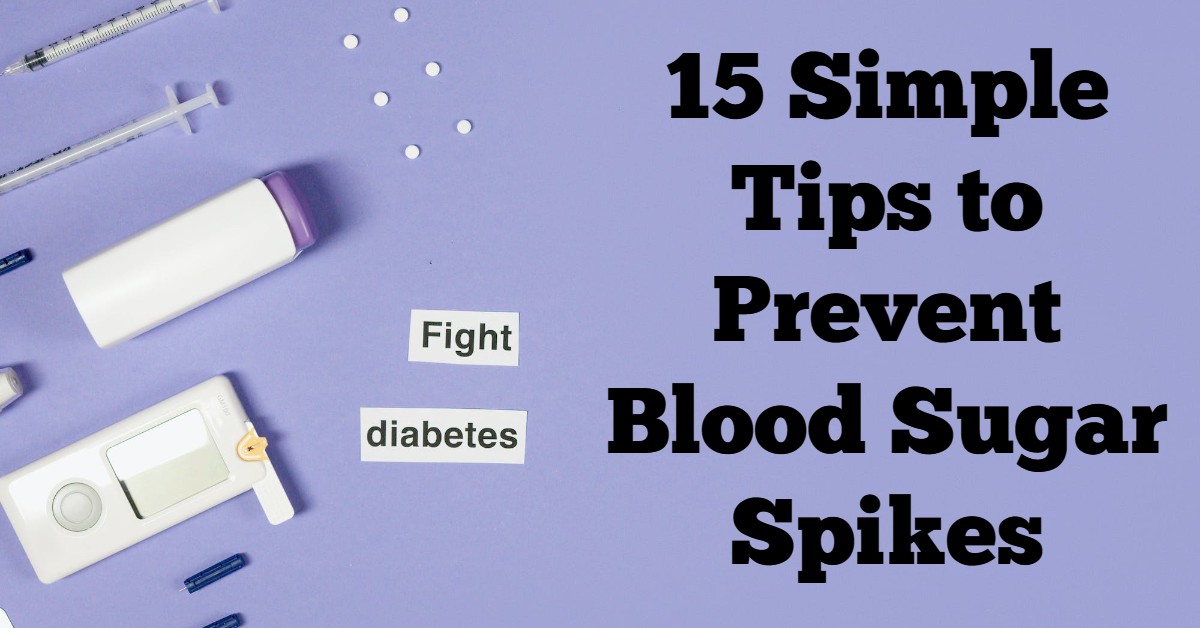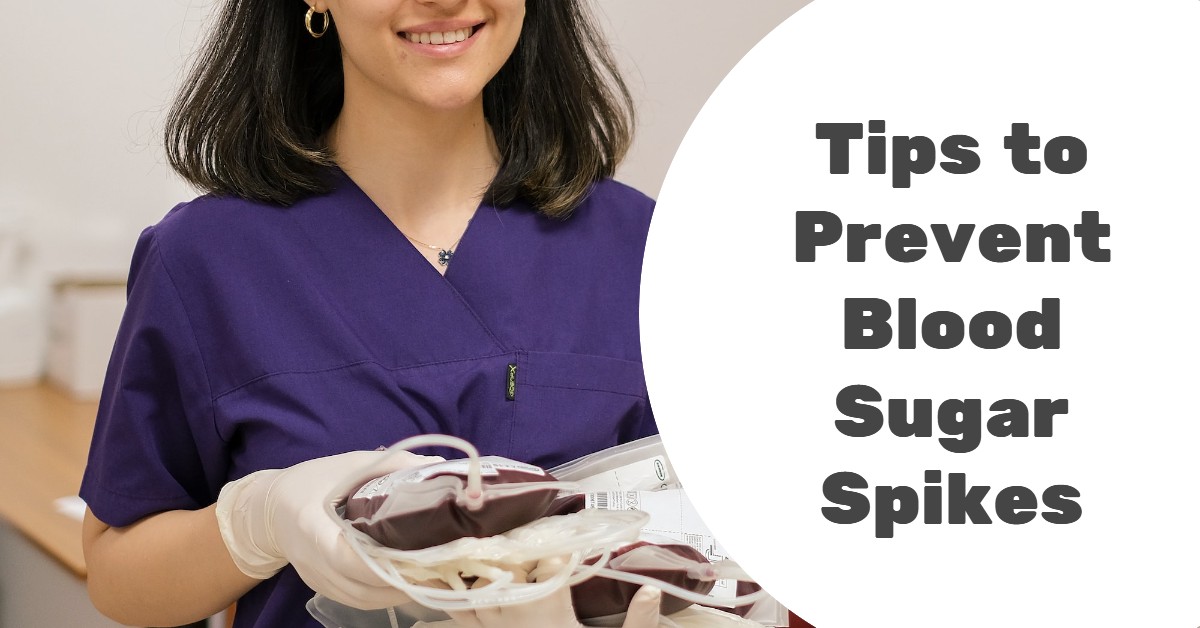15 Tips to Prevent Blood Sugar Spikes (Complete Guide 2023)

Do you desire to improve your health and prevent blood sugar spikes? Here are proven and tested tips to prevent blood sugar spikes. Read through this guide and find all it takes to maintain a good blood sugar level.

You may be able to stabilize your blood sugar by adopting dietary modifications, such as limiting sugar and processed carbohydrates, drinking adequate water, and engaging in regular exercise.
Blood sugar spikes happen when your blood sugar increases after eating and then drops quickly. They may result in short-term fatigue and appetite. Type 2 diabetes can develop over time if your body is unable to adequately control blood sugar.
Diabetes is a growing public health issue. In actuality, 29 million individuals have diabetes, and 25% of them are completely unaware of their condition.
Your blood arteries may stiffen and constrict as a result of blood sugar fluctuations, which increases your risk of having a heart attack or stroke.
What is Blood Sugar Spikes?
A person’s blood sugar level has a technical term known as glycaemia. Glycaemia is also known as blood sugar level, blood sugar concentration, or blood glucose level. It is the measure of glucose concentrated in the blood of humans and other animals.
According to Wikipedia, approximately 4 grams of dissolved glucose, a simple sugar, is present in the blood plasma of a 70 kg (154 lb) human at all times.
Blood sugar spikes is therefore an increase in your blood sugar level. A blood sugar spike happens when glucose builds up in the bloodstream and your blood sugar levels increase.
So, what are the tips to prevent blood sugar spikes? Read on to find out.
Common Causes of Blood Sugar Spikes
Before we look at how to prevent blood sugar spikes, here are the common causes of the problem:
- Your diet.
- Too little sleep.
- Too much (or too little) exercise.
- Stress.
- Some medications such as insulin, corticosteroids, diuretics (water pills), drugs used to treat depression and blood pressure medicines.
- Not brushing and flossing.
- Smoking.
- Dehydration.
Haven known the causes of the blood sugar spikes, we can now profer solution to the issue.
Preventing Blood Sugar Spikes (FAQs & Answers)
1. What are some symptoms of blood sugar spikes?
Symptoms of blood sugar spikes can include fatigue, increased thirst, frequent urination, blurred vision, and headaches.
2. Should I avoid all carbohydrates to prevent blood sugar spikes?
No, you don’t need to avoid all carbohydrates to prevent blood sugar spikes. It’s important to choose healthy carbohydrates, such as fruits, vegetables, and whole grains, and watch your portion sizes.
3. How can I prevent blood sugar spikes?
You can prevent blood sugar spikes by monitoring your carbohydrate intake, eating smaller, more frequent meals, choosing high-fiber foods and incorporating lean protein into your meals. Also avoid sugary drinks, stay hydrated, get regular exercise, manage stress, and get enough sleep.
4. What is the glycemic index (GI)?
The glycemic index (GI) is a measure of how quickly foods raise your blood sugar levels. Foods with a high GI, such as white bread and sugary drinks, can cause blood sugar spikes.
Must Read: How to Lower Cholesterol Naturally (The Ultimate Guide)
15 Simple Tips to Prevent Blood Sugar Spikes
Here are 15 easy steps you may take to avoid blood sugar spikes.

1. Eat less processed carbohydrates
Sugars or refined grains are examples of refined carbohydrates, sometimes referred to as processed carbs. Table sugar, white bread, white rice, soda, candy, morning cereals, and desserts are a few examples of frequent sources of refined carbohydrates.
Refined carbohydrates are devoid of nearly all vitamins, minerals, fiber, and other nutrients. Because they are metabolized by the body so fast and readily, refined carbohydrates are considered to have a high glycemic index. As a result, blood sugar levels increase. An rise in type 2 diabetes is linked to diets heavy in carbohydrates with a high glycemic index. After consuming meals with a high glycemic index, your blood sugar may jump and then decrease, which can increase appetite, cause overeating, and result in weight gain.
Carbs have a variable glycemic index. It depends on a variety of factors, including ripeness, what else you consume, and how the carbohydrates are prepared or cooked. In general, whole-grain foods, along with the majority of fruits, non-starchy vegetables, and legumes, have a lower glycemic index.
2. Consume more fiber
Eating more high-fiber foods will help reduce blood sugar rises in addition to changing your diet. Foods high in fiber also contain slow-digesting carbs, which aid in digestion and decrease cholesterol. Due to the fact that fiber takes longer to digest in your intestines, these carbs aid in preventing blood sugar spikes after meals. As a result, glucose might enter your circulation more gradually.
Fruit, whole grains, and legumes are all excellent sources of fiber. Increasing your total fiber intake may assist in lowering your blood sugar levels after meals.
3. Cut back on portion sizes
Meal portion control might also be beneficial. Your blood sugar is significantly influenced by how much food you eat. You may cut down on your portions by using smaller dishes and bowls or by splitting your meal in half. The leftovers can be saved for a dinner later in the day or for a snack an hour or two later.
4. Make wise food combinations
When attempting to prevent blood sugar increases, meal composition is also important. The secret is to make sure your meals and snacks include the right balance of carbs, proteins, and fats.
Only consuming a lot of carbohydrate-rich foods during meals or snacks results in an excessive release of sugar into the circulation. Combining carbohydrates with proteins or fats can help maintain a stable blood sugar level by slowing down digestion and absorption in the intestines since proteins and fats take longer to digest than carbohydrates do. As a result, the pace at which sugar enters the bloodstream will be slowed.
For instance, choose a healthy protein choice and a healthy carb option from the table below to create a snack that is low in sugar.
5. Drink more water
Lack of water intake might cause blood sugar to increase. Your body creates the hormone vasopressin when you are dehydrated. As a result, your kidneys are encouraged to retain fluid and the body is prevented from excreting extra sugar in your urine. Your liver also releases more sugar into the blood as a result of it.

An increase in vasopressin levels in the blood was shown to be associated with an increase in insulin resistance and type 2 diabetes over a period of 12.6 years in a long-term research including 4,742 persons in Sweden.
It’s debatable how much water is ideal to consume. Basically, it depends on the person. You should always drink as soon as you feel thirsty, and you should drink more water in hot weather and when exercising. Drink water instead of sugary drinks or sodas since they will cause blood sugar to increase.
6. Integrate some vinegar into your regular diet
Numerous studies have demonstrated the positive effects of vinegar on health, especially apple cider vinegar. Evidence suggests that it can help with anything from slimming down to fighting germs and keeping blood sugar steady. Vinegar has been shown in several trials to improve insulin responsiveness and mitigate glucose spikes.
Participants whose blood sugar levels were measured after eating a meal comprising 50 grams of carbohydrates discovered that vinegar considerably lowered their levels. The researchers also saw a correlation between vinegar strength and blood sugar reduction.
The impact of vinegar on blood sugar levels following carbohydrate consumption was investigated in a separate study. According to the study, insulin sensitivity was boosted by vinegar by 19%-34%. Adding vinegar to food can decrease its glycemic index and so prevent blood sugar increases. When consumed with carbohydrates, vinegar has been found to stimulate the release of insulin and aid in the regulation of blood sugar.
7. Obtain good sleep
Poor blood sugar regulation has been linked to both too little and too much sleep. Even one or two sleepless nights might have an impact on your blood sugar levels.Sleeping too little, or for only four hours, raised insulin resistance and blood sugar levels, according to a study of nine healthy individuals.
Quality of sleep is just as significant as quantity. According to a research, the most crucial sleep stage for regulating blood sugar is deep sleep.
8. Reduce your alcohol consumption
Alcoholic beverages frequently have a lot of extra sugar. In instance, mixed beverages and cocktails, which can include up to 30 grams of sugar per serving, fall under this category.
Similar to added sugar in food, the sugar in alcoholic beverages will cause blood sugar to increase. Most alcoholic beverages also don’t offer much in the way of nourishment. They are essentially empty calories, much like added sugar.
Drinking excessively can reduce insulin’s efficiency, which results in high blood sugar and eventually type 2 diabetes. However, research indicates that regulated, moderate drinking may actually protect against type 2 diabetes development and improve blood sugar regulation.
9. Moving after eating
Following a meal, becoming active or exercising can help reduce your blood sugar in a variety of ways. First off, during activity, muscles can utilize the glucose that doesn’t reach the circulation.
Additionally, exercise redirects blood away from the intestines, which lessens glucose absorption. Exercise will improve blood flow to the skin’s surface if you take insulin before a meal or snack, helping the insulin to absorb and work more quickly.
Exercise doesn’t have to be intense to lower blood sugar levels after meals. One study found that glycemic control over a 24-hour period was greatly improved by just 15 minutes of walking after meals. In addition, decreasing 3-hour post-meal glucose was dramatically reduced by a brief post-meal walk as opposed to a 45-minute continuous walk.
10. Exercise more
Exercise improves your cells’ sensitivity to the insulin hormone, reducing blood sugar rises.
Additionally, muscle cells absorb sugar from the blood during exercise, which lowers blood sugar levels. Exercise of any intensity, whether vigorous or moderate, has been shown to lessen blood sugar peaks.

Exercise on an empty stomach or one that is already full may affect blood sugar regulation. According to one study, exercising before breakfast successfully lowers blood sugar levels compared to exercising later.
Increasing activity also aids in weight reduction, providing a double punch to blood sugar spike prevention.
Related: 11 Exercises to Keep You Healthy at the Office
11. Maintain a healthy weight
Obesity might make it more challenging for your body to use insulin and regulate blood sugar levels. This may result in blood sugar increases and an increased risk of type 2 diabetes.
There is a ton of data that connects obesity to insulin resistance and the onset of type 2 diabetes, while the exact mechanisms by which it occurs are still unknown.
On the other side, it has been demonstrated that losing weight enhances blood sugar regulation. It’s challenging for your body to regulate blood sugar levels if you’re overweight. Your blood sugar regulation can be improved even with a small weight loss.
12. Incorporate lean protein into your meals
Adding lean protein, such as chicken, fish, or tofu, to your meals can help slow down the absorption of glucose into the bloodstream and prevent blood sugar spikes.
13. Avoid sugary drinks
Sugary drinks, such as soda and fruit juice, can cause blood sugar levels to spike quickly. It’s best to avoid these drinks and choose water or unsweetened beverages instead.
14. Monitor your blood sugar levels
Checking your blood sugar levels regularly can help you identify patterns and make adjustments to your diet and lifestyle as needed.
15. Manage stress
Stress can cause blood sugar levels to spike. To prevent this, try relaxation techniques, such as deep breathing, meditation, or yoga.
Conclusion:
Preventing blood sugar spikes is essential for maintaining overall health, especially if you have diabetes. By following a few simple tips such as monitoring your carbohydrate intake, incorporating lean protein and high-fiber foods, staying hydrated, managing stress, and getting regular exercise and enough sleep, you can help regulate your blood sugar levels and prevent spikes that can cause health complications.
It’s important to work with your healthcare provider to develop a personalized plan for managing your blood sugar levels if you have diabetes. By taking a proactive approach to your health, you can reduce the risk of complications and enjoy a healthier, more balanced life.
We hope you found this article on 15 Simple Tips to Prevent Blood Sugar Spikes helpful. Please share it with others. Thank you.
Recommended:
You may want to check out the following related articles:
How to Control High-Blood Pressure (The Ultimate Guide)
Top Healthy Foods To Eat Everyday (2023 Guide)
The Impact Of Social Media On Mental Health




